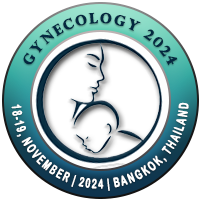
Pravin Mhatre
Emeritus G.S.Medical college KEM AND Wadia hospital, IndiaTitle: Novel Technique of Vaginoplasty Developing Normal Vagina, Role of Stemness Markers and Translational Genes
Abstract
Aims and Objectives: To study development of neo-vagina by metaplastic conversion of peritoneum, To identify translational Stemness markers using NANOG/OCT4/SOX2 from serial neo-vaginal mRNA, cDNA and to study role of WNT and HOXA genes in patients undergoing vaginoplasty.
Material and Methods: 75 MRKH Syndrome women underwent laparoscopic peritoneal vaginoplasty (LPV). Two patients underwent serial neo-vaginal biopsies on day 0, 7-9, 12-14, 21 and 33. Fifteen MRKHS and twelve controls were subjected for neo-vaginal biopsy to detect genes upregulation. Remaining patients were evaluated anatomically and functionally.
Results: The translational stemness markers NANOG, OCT4 and SOX2 responsible for neo-vaginal formation were identified. Their appearance, concentration at different stages of conversion were demonstrated. The neo-vagina has shown up-regulation of these translational stemness markers. The study demonstrates expression of the specific genes (WNT4, WNT5A and WNT7A) and their role in formation of the neo-vagina. In the subjects stemness markers (NANOG, OCT4 and SOX2) appeared from day 9 to 14 of the neo-vaginal biopsies and after achieving the peak declined later. Genetic analysis showed low values in HOXA 9,10,11,13 and up-regulation of WNT 4A,5A,7 genes in neo-vagina.
Conclusions: Study shows peritoneal metaplastic conversion to normal vagina. Identified the translational stemness markers and genes responsible. The neo-vagina has shown up-regulation of these genes. The study demonstrates expression of the specific genes (WNT4, WNT5A and WNT7A) and their role in formation of the neo-vagina. Furthering this research, activating these genes may lead to treatment of developmental defects of Mullerian duct, obviating the need of transplant.
Ongoing Research: Autologus mesothelial stem cells from Fat programmed to be smooth muscle cells and their use in developoing Mullerian structures
Biography
Pravin Mhatre is Professor Emeritus G.S.Medical college KEM AND Wadia hospital, Mumbai India. He established the gynecological transplant faculty with government, and was registered as the “First Gynec Transplant Surgeon” in 2002. He established the first government certified “Ovarian Transplant Centre”. Worlds First successful Ovarian Transplant 2002. He was instrumental in forming the guidelines and norms for ovarian transplant, In 2005 he established the “first Ovarian cryopreservation Bank”. This was preceded by almost 20 years of research in animal experiments, renal transplant observer-ship (Oxford and India), vascular and micro-vascular surgery, postmortem dissections and experiments at NIRRH. Dr Pravin Mhatre has developed peritoneal Laparoscopic Vaginoplasty resulting in development of normal vagina, identified the progenitor cell and the GENOMES responsible for this change. This research will have therapeutic implications in treating Mullerian agenesis. Currently he is pursuing the research in developing mesothelial stem cell for therapeutic applications in Mullerian agenesis.

